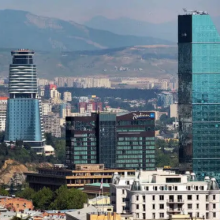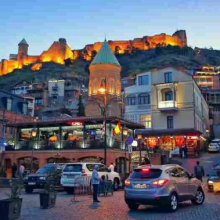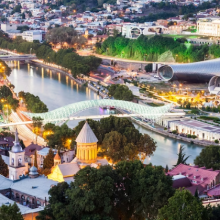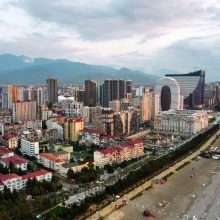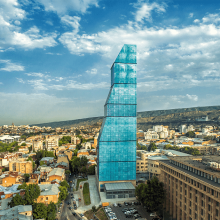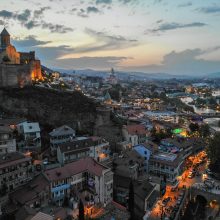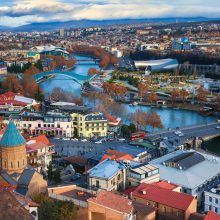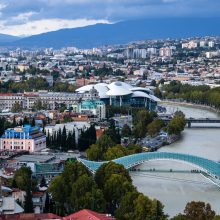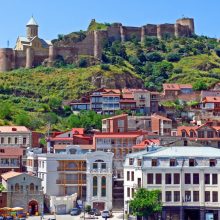
Georgia (საქართველო) is a transcontinental country at the intersection of Eastern Europe and Western Asia. It is part of the Caucasus region, bounded by the Black Sea to the west, Russia to the north and northeast, Turkey to the southwest, Armenia to the south, and by Azerbaijan to the southeast. The country covers an area of 69,700 square kilometres.
Georgia has a warm, temperate climate. The Likhi mountain range divides the country into western and eastern halves, shielding the eastern part of the country from the influence of the Black Sea and creating a continental climate. The average temperature in the east ranges between (20C to 24C) in summer and between (2C to 4C) in winter.
Western Georgia experiences a sub-tropical, maritime climate, and summer temperatures average around (22C), dropping to (5C) in winter. The west can get humid and receives rainfall throughout the year, though autumn and winter receive the heaviest precipitation. In the east, rainfall peaks in spring, and winter is the driest season. The mountainous areas receive a lot of rain, but the amount of rainfall generally decreases with distance from the coast.
Georgia has some of the best universities in the Caucasus region where a lot of foreign students come from Asian countries like India to study here which helps economy to grow.
The country has a high-level educational system but it still needs to be improved.
Georgia is a part of the Lisbon Recognition Convention and Bologna Process, and therefore, the Georgian public education system (general, vocational, and higher) is fully compatible with international standards of education. Diplomas issued by Georgian public high schools, colleges, and higher education institutions offering BA, MA, and Ph.D. programs, are recognized by European countries and the USA.
Georgia (საქართველო)
is a transcontinental country at the intersection of Eastern Europe and Western Asia. It is part of the Caucasus region, bounded by the Black Sea to the west, Russia to the north and northeast, Turkey to the southwest, Armenia to the south, and by Azerbaijan to the southeast. The country covers an area of 69,700 square kilometres.Georgia has a warm, temperate climate. The Likhi mountain range divides the country into western and eastern halves, shielding the eastern part of the country from the influence of the Black Sea and creating a continental climate. The average temperature in the east ranges between (20C to 24C) in summer and between (2C to 4C) in winter.
Western Georgia experiences a sub-tropical, maritime climate, and summer temperatures average around (22C), dropping to (5C) in winter. The west can get humid and receives rainfall throughout the year, though autumn and winter receive the heaviest precipitation. In the east, rainfall peaks in spring, and winter is the driest season. The mountainous areas receive a lot of rain, but the amount of rainfall generally decreases with distance from the coast.
Georgia has some of the best universities in the Caucasus region where a lot of foreign students come from Asian countries like India to study here which helps economy to grow.
The country has a high-level educational system but it still needs to be improved.
Georgia is a part of the Lisbon Recognition Convention and Bologna Process, and therefore, the Georgian public education system (general, vocational, and higher) is fully compatible with international standards of education. Diplomas issued by Georgian public high schools, colleges, and higher education institutions offering BA, MA, and Ph.D. programs, are recognized by European countries and the USA.


